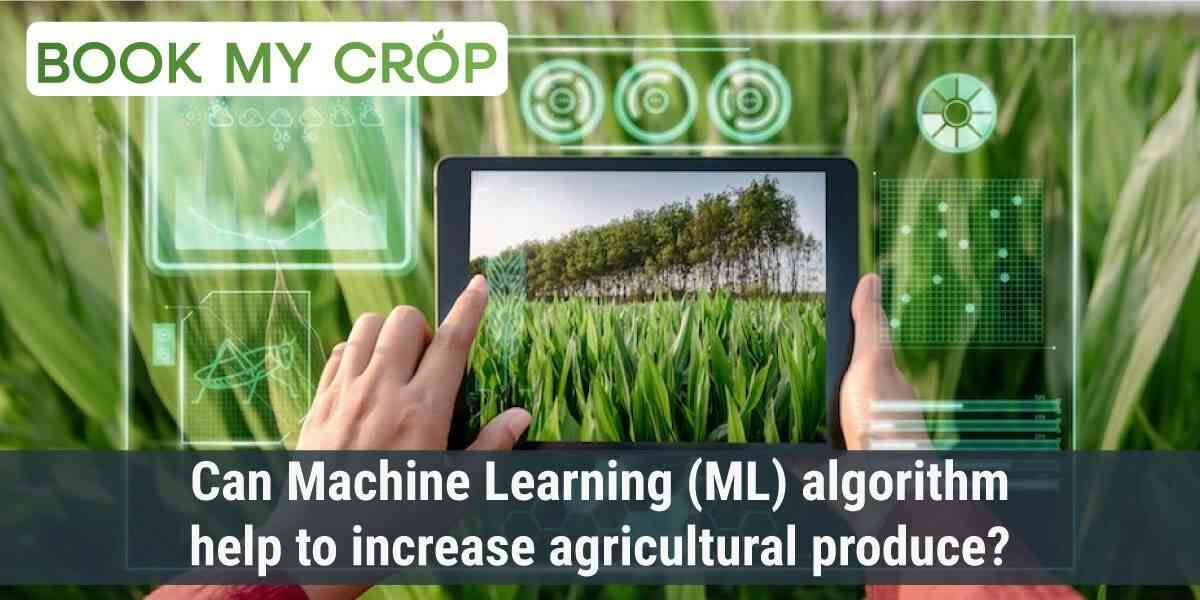Can Machine Learning (Ml) Algorithm Help To Increase Agriculture Produce?
- - Category: Agriculture
- - 28 Jul, 2022
- - Views: 81
- Save

Book My Crop is one of the leading Agriculture companies in India.
Machine learning (ML) methods have developed as alternatives as well as complementary tools for agricultural and related modelling.
Machine learning techniques are rapidly being applied in yield forecasting, agricultural production, as well as forest management studies. In artificial intelligence, machine learning refers to the capability of a computer to learn from examples and past experiences on its own, without any prior instruction from a human.
In computer science, machine learning refers to a set of techniques that allow software programmes to get better at predicting the outcomes of research-related systems.
Making algorithms that utilise statistical analysis to anticipate an output and then update those predictions when new data becomes available is central to machine learning.
Two components of ML that are widely employed to address complicated challenges when human expertise fails to do so are the ability to continually improve with increasing precision and the extraction of more information from enormous data sets.
The development of the concept of machine learning, in conjunction with the technology of big data and high-speed computers, has created a new possibility to measure and comprehend data-intensive operations in the next generation of smart farming.
Today, machine learning is used in every aspect of the agricultural industry, from preparing the soil and breeding seeds to monitoring the water feed. It even extends all the way to the point where robots pick up the crop and use computer vision to determine whether or not it is ready to be harvested.
At every level of agriculture, including crop management, soil management, animal management, disease detection, and much more, there is potential for machine learning to be beneficial. In order to gain a better understanding of ecosystem dynamics and agricultural implications, machine learning algorithms research soil moisture, evaporation processes, as well as temperature.
How exactly does Machine Learning (ML) improve the efficiency of farming and increase agriculture produce?
Every farmer should strive to achieve precision in their farming. Machine learning (ML) and IoT hardware are two examples of developing technologies that can be combined to improve farming efficiency and increase agriculture produce.
The application of machine learning is anticipated to be the next significant technological advance. There is a high probability that it will never be able to take the place of the farmer. On the other hand, farm owners are faced with difficult decisions on a daily basis, and ML applications can offer farmers insights that will help them make those decisions more efficiently.
Farmers today have access to an overwhelming amount of data—far more data than they are able to process on their own without the assistance of ML technologies. ML is capable of quickly analysing large amounts of data. On the basis of the information, it is able to propose a certain strategy. For instance, it could recommend the optimal time to plant in order to minimise the risk of attracting pests and diseases.
Advantages of using ML-based Applications:
In today's world, applications that are based on machine learning are used to analyse daily, weekly, or monthly evapotranspiration. This allows for more effective use of irrigation systems and also allows for the daily dew point temperature prediction, which assists in the identification of weather occurrences that are predicted.
Computer vision and contemporary ML algorithms have been integrated to provide data for the multidimensional research of weather, crops, as well as economic conditions.
Apart from that, ML is essential for weed detection, which is a significant challenge for traditional agricultural production methods. It might be challenging to identify weeds since it is difficult to tell them apart from the crop that is intended for harvest. Book My Crop is the most popular as well as trusted agriculture company in India, where potential buyers can place an order for their preferred agriculture produce online.
It may be possible to overcome such challenges by applying machine learning algorithms, which do so at a low financial and ecological cost. The algorithms that are applied in crop management methods have already developed into artificial intelligence systems.
